A VISION FOR 2020




 BY HANNAH HERNER
BY HANNAH HERNER





 BY HANNAH HERNER
BY HANNAH HERNER
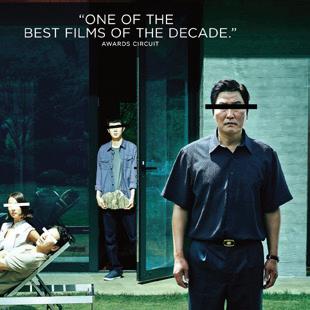

Cathy Jennings, Chair Tom Wills, Bruce Doeg, Demetria Kalodimos, Ann Bourland
Amanda Haggard • Linda Bailey • Barbara Womack • Hannah Herner • Tom Wills
• Ridley Wills II • Martin Hart-Landsberg
• Vicky B. • Jennifer A. • Joe Nolan • Mr. Mysterio • William B. • Wild Bill • Victor J.
• Anthony G. • Chris W. • Gary E.




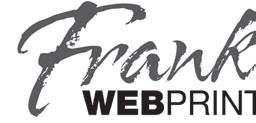
Cathy Jennings
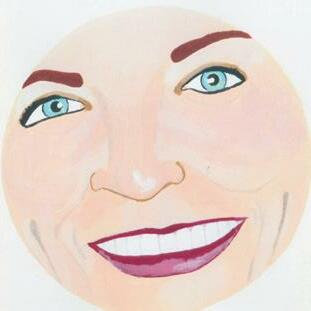
• Tom Wills • Joe First
• Andy Shapiro • Michael Reilly • Ann Bourland • Patti George • Linda Miller • Deborah Narrigan • John Jennings • Barbara Womack • Colleen Kelly • Janet Kerwood • Logan Ebel • Christing Doeg • Laura Birdsall
• Nancy Kirkland • Mary Smith • Andrew Smith • Ellen Fletcher • Michael Chavarria
Will Connelly, Tasha F. Lemley, Steven Samra, and Tom WIlls Contributor Co-Founders
Editorials and features in The Contributor are the perspectives of the authors. Submissions of news, opinion, fiction, art and poetry are welcomed. The Contributor reserves the right to edit any submissions. The Contributor cannot and will not endorse any political candidate.

Submissions may be emailed to: editorial@thecontributor.org
Requests to volunteer, donate, or purchase subscriptions can be emailed to: info@thecontributor.org Please email advertising requests to: advertising@thecontributor.org







Mailng Address

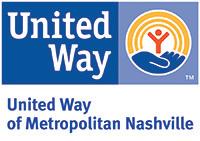
The Contributor P.O. Box 332023, Nashville, TN 37203
Editor’s Office: 615.499.6826 Vendor Office: 615.829.6829



Proud Member of:
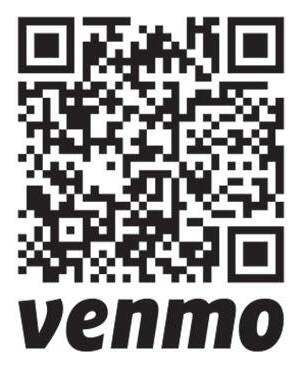




Printed at:
Follow The Contributor:
Copyright © 2018 The Contributor, Inc. All rights reserved.
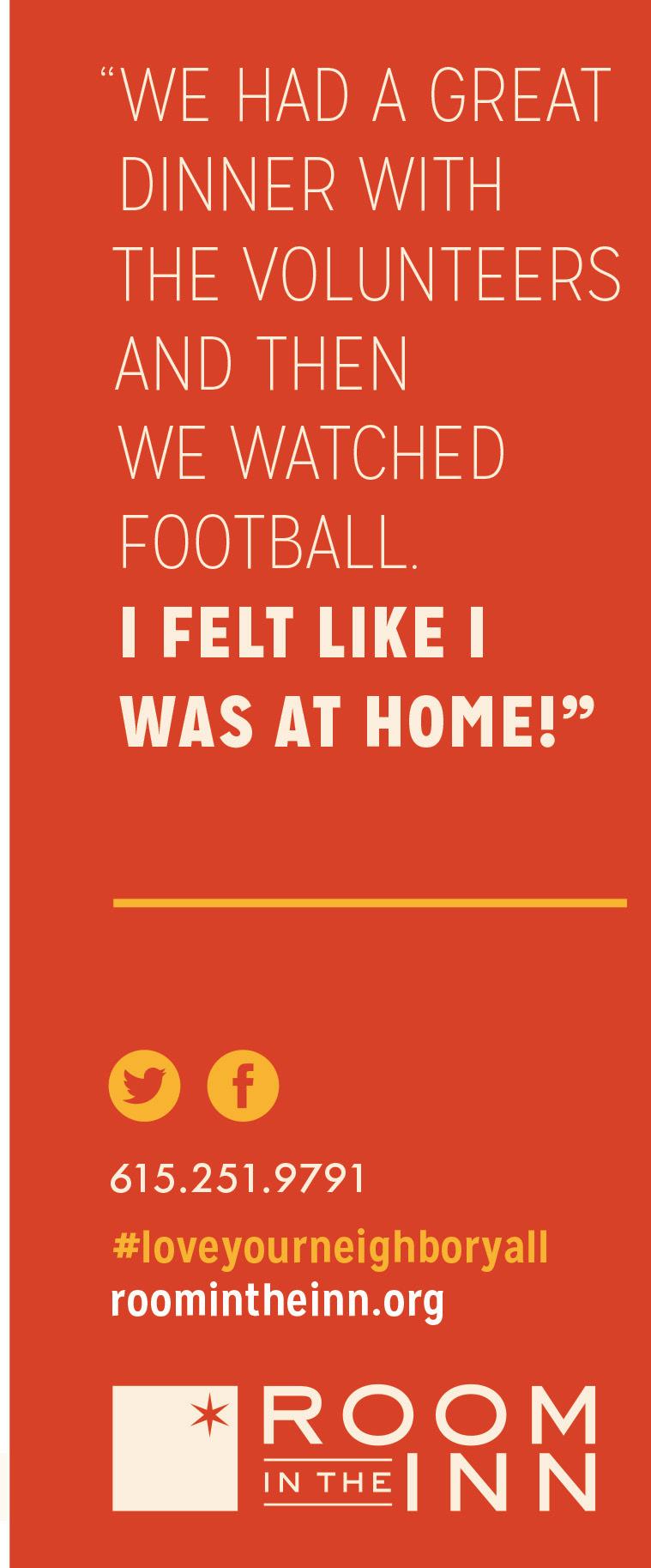 Cathy Jennings Executive Director
Andrew Krinks Editor Emeritus
Cathy Jennings Executive Director
Andrew Krinks Editor Emeritus
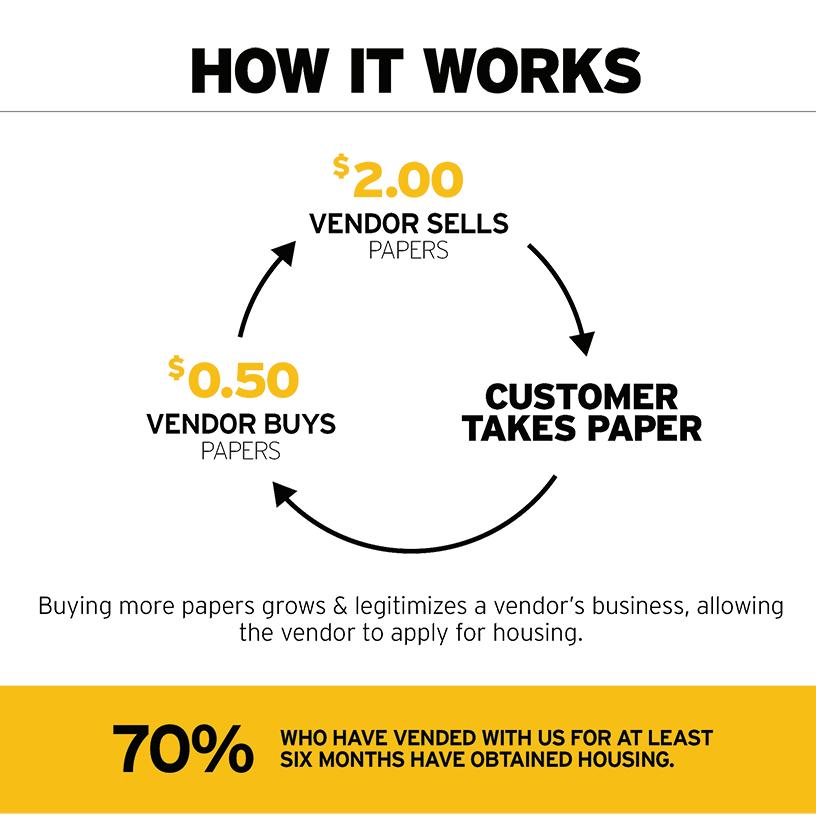
The paper you just paid for was bought by someone else first, otherwise it wouldn’t exist. That’s how The Contributor works. A vendor who experienced homelessness paid 50 cents for this paper and then sold it to you. By buying it and taking it with you, you’ve just encouraged that vendor to buy another. BOOM! That’s the solution. Now keep reading. This paper has something to say to you.
Street papers provide income for the homeless and initiate a conversation about homelessness and poverty. In 2007, The Contributor founders met at the Nashville Public Library downtown to form one. In a strike of lightning we named it The Contributor to infer that our vendors were “contributors to society,” while their customers could contribute to their work. But, thunder from lighting is always delayed … It took three years, but Nashville embraced us like no other city in the world. The Contributor became the largest selling street paper per-capita on the globe. And today 50 percent of our six months or longer tenured vendors have found housing. BOOM! The thunder has struck.
The Contributor is a different kind of nonprofit social enterprise. We don’t serve meals or provide emergency shelter. We don’t hire people in poverty to create products or provide a service. Rather, we sell newspapers to homeless people who work for themselves. We train them to sell those papers to you, keep the money they earn, and buy more when they need to replace their stock.
Our biggest fans don’t always get this. Like lightning without the thunder, they see the humanity of the vendor but misunderstand the model. Case in point: In 2013 during a funding crunch, a representative of one of Nashville’s biggest foundations exclaimed, “I’m such a big fan that I never take the paper!” We responded, “Well, that’s why we are in a funding crunch.” BOOM! Thunder was heard. Taking the paper makes our model work — not taking it breaks it. And selling the paper twice doesn’t just fund the paper, it funds housing and change. BOOM! Our vendors report their sales to qualify for subsidized housing and even for standard housing deposits and mortgages. They don’t consider your buying the paper a “donation.” It is a sale. When they sell out, they buy more and build the paper trail of a profitable business. Until making these sales, many of our vendors had never experienced the satisfaction of seeing their investment pay off. And when it does, it liberates! They have become “contributors” to their own destiny. And Nashville has become a city of lightning and thunder. BOOM!
Now that you are a SUPPORTER , become an ADVOCATE or a MULTIPLIER You are already a SUPPORTER because you know that taking the paper makes the model work. You bought the paper and you are reading it. Now your vendor is one copy closer to selling out, which is exciting! Now you can become an ADVOCATE when you introduce your friends to your favorite vendor, follow us and share our content on social media, contact us when you witness a vendor in distress or acting out of character, or explain why others should pick up a copy and always take the paper when they support a vendor. And, you can become a MULTIPLIER when you advocate for us AND directly donate to us or become an advertiser or sponsor of The Contributor. Our income stream is made of 50-cent- at-a-time purchases made from our vendors, matched by contributions, ad sales and sponsorships from multipliers like you. Because our vendors are business owners, your donations are seed-money investments in their businesses and multiply in their pockets. Every donated dollar multiplies four-to-seven times as profits in the pockets of our vendors. Thanks for contributing.
El periódico que usted acaba de pagar fue primeramente comprado por alguien mas, de otra manera no existiría. Así es como funciona The Contributor. Un vendedor que está sin hogar pagó 50 centavos por este periódico y después se lo vendió a usted. Al comprarlo y llevarlo con usted, usted animo a este vendedor a comprar otro. BOOM! Esa es la solución. Ahora continúe leyendo. Este periódico tiene algo que decirle. Los periódicos vendidos en la calle proveen ingresos para las personas sin hogar e inicia una conversación sobre lo que es la falta de vivienda y la pobreza. En el 2007, los fundadores de The Contributor se reunieron en una librería pública en Nashville para formar uno. Y como golpe de un rayo, le llamamos The Contributor para dar a entender que nuestros vendedores eran “contribuidores para la sociedad,” mientras que los consumidores podrían contribuir a su trabajo. Pero, el trueno siempre tarda más que el rayo. Nos llevó tres años, pero Nashville nos acogió como ninguna otra ciudad en el mundo. The Contributor se volvió uno de los periódicos de calle más vendido en el globo. Y hoy el 50 por ciento de nuestros seis meses o más de nuestros vendedores titulares han encontrado casa. BOOM! Ha llegado el trueno.
BY JOHN JENNINGSThe Contributor es una empresa social sin fines de lucro muy diferente. Nosotros no servimos comida or proveemos alojo de emergencia. No contratamos gente en pobreza para crear productos or proveer un servicio. En vez, nosotros vendemos periódicos a las personas sin hogar para que ellos trabajen por ellos mismos. Nosotros los entrenamos como vendedores, ellos se quedan el dinero que se ganan, y ellos pueden comprar más cuando necesiten reabastecer su inventario.
Nuestros mas grandes aficionados no entienden esto. Como un rayo sin trueno, ellos ven la humanidad de el vendedor pero no comprenden el modelo. Un ejemplo: En el 2013 durante un evento de recaudación de fondos, uno de los representantes de una de las fundaciones más grandes de Nashville, exclamó: “Soy un gran aficionado, y es por eso que nunca me llevo el periódico.” Al cual nosotros respondimos: “Y es por esa razón por la cual estamos recaudando fondos.” BOOM! Y se escuchó el trueno! El pagar por el periódico y llevárselo hace que nuestro sistema funcione, el no llevarse el periódico rompe nuestro sistema. Y el vender el papel dos veces no da fondos para el periódico, pero da fondos para casas y causa cambio. BOOM! Nuestros vendedores reportan sus ventas para calificar para alojamiento subvencionado y hasta para una casa regular, depósitos e hipotecas. Ellos no consideran el que usted compre el periódico como una “contribución” pero más lo consideran como una venta.
Cuando se les acaba, ellos compran mas y asi logran establecer un negocio rentable. Hasta que lograron hacer estas ventas, muchos de nuestros vendedores nunca habían experimentado el placer de ver una inversión generar ganancias. Y cuando logran hacer esto, da un sentido de Liberación! Ellos se han vuelto contribuidores de su propio destino, y Nashville la ciudad de el trueno y el rayo. BOOM!
Ahora que te has vuelto nuestro SEGUIDOR, vuelve te en un ABOGADO o un MULTIPLICADOR. Ya eres nuestro SEGUIDOR, porque sabes que al llevarte este periódico sabes que esto hace que nuestro modelo funcione. Compraste el papel y lo estas leyendo. Ahora nuestro vendedor está a una copia más cerca de venderlos todos. Que emoción!
Ahora que te has vuelto nuestro ABOGADO cuando presentes a tus amigos a tu vendedor favorito, siguenos y comparte nuestro contenido en social media, contactanos cuando seas testigo de un vendedor actuando de manera extraña o fuera de carácter. O explicale a tus amigos porque ellos deben de llevarse el periódico cuando ayuden a un vendedor.
Te puedes volver un MULTIPLICADOR cuando abogues por nosotros, Y directamente dones a nosotros o te vuelvas un anunciador o patrocinador de The Contributor. Nuestra fuente de ingresos consiste en ventas de 50 centavos hechas por nuestros vendedores, igualadas por contribuciones, venta de anuncios, y patrocinios de multiplicadores como usted. Porque nuestros vendedores son dueños de negocios, las donaciones que den son dinero que es invertido y multiplicado en sus bolsas. Cada dólar donado se multiplica de cuatro a siete veces en la bolsa de nuestros vendedores.
Gracias por Contribuir.On Dec. 10, 2019, many Tennesseans gathered at the First Amendment Center to celebrate International Human Rights Day.
This day is celebrated around the world to commemorate the 1948 adoption of the Universal Declaration of Human Rights by the United Nations.
The principles included in this declaration include the right to decent housing, education, the right to be free from discrimination of any kind, to have free thought and speech, to vote, to be free from violence, to have equal access to public service and to have fair working condition.

Five Tennesseans were honored with awards in three categories this year: The Rising Advocate Award, Outstanding Service Award and the Lifetime Achievement Award.
The Rising Advocate awards went to Francis Anderson, who works with refugees at Catholic Charities of Middle Tennessee and Tequila Johnson, Co-Founder and Vice President of The Equity Alliance. The Outstand -
ing Service Awards were given to Rev. Keith Caldwell, President of the Nashville branch of the NAACP and to Rashed Fakhruddin, past president of the Islamic Center of Nashville.
“This is a great honor and I believe that we all can begin with ourselves as change agents,” Caldwell said. “We can all try to find points of interaction.”
The Lifetime Achievement Awards went to Rev. Edwin Sanders II, pastor and founder of the Metropolitan Interdenominational Church and to Attorney Abby Rubenfeld.
“This award is an amazing honor — I have dedicated my career to civil and human rights and I am humbled to be acknowledged by a lifetime award for that meaningful work,” Rubenfeld said.
The theme for the Nashville Celebration this year was “Vote on Purpose: The Communal Impact of One Vote,” and focused on the 100 year anniversary of the women’s suffrage movement and how voter’s rights impact all other human rights.

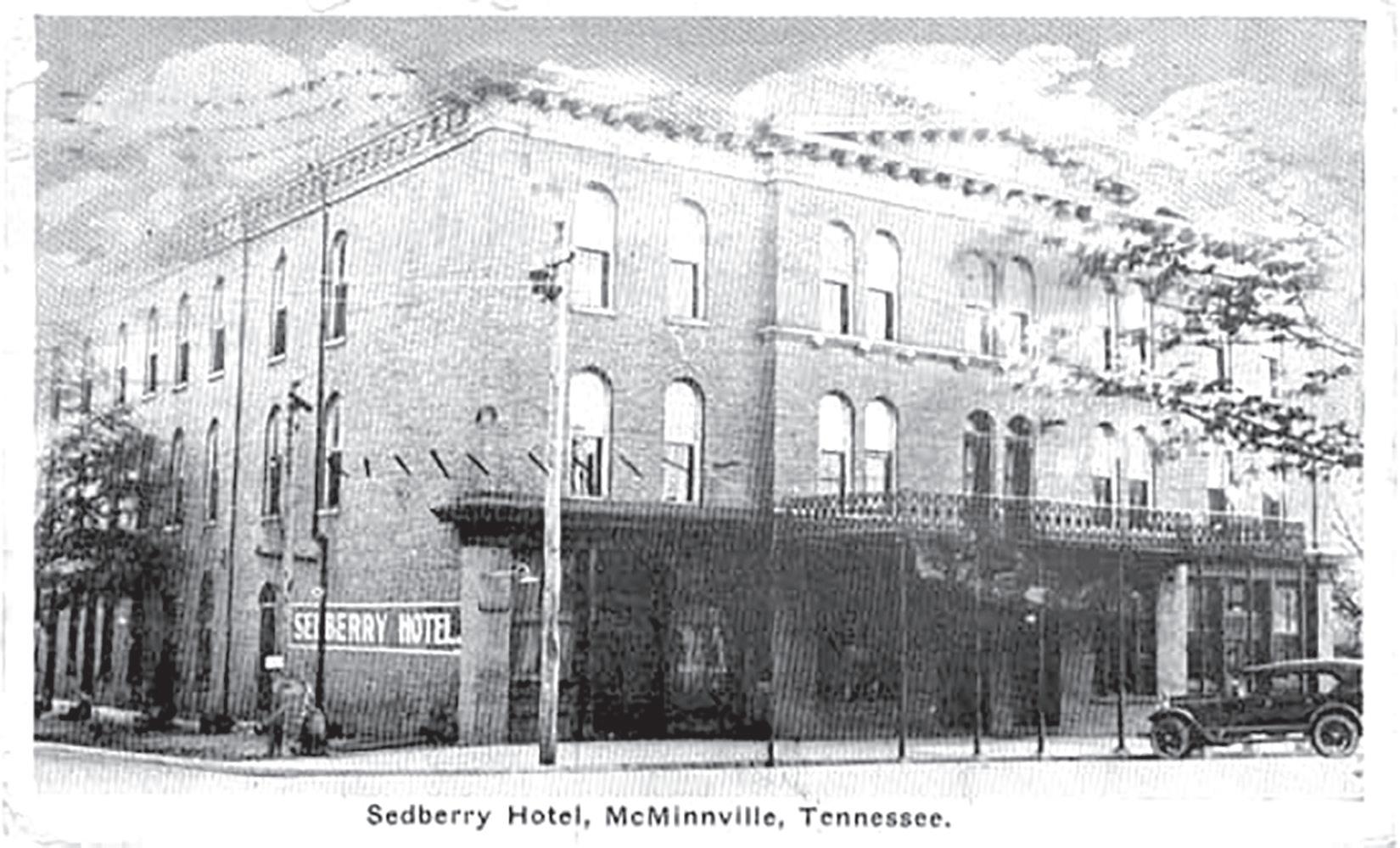 BY RIDLEY WILLS II
BY RIDLEY WILLS II
The last time I was in McMinnville, I forgot to look for the old three-story, red-brick Sedberry Hotel, long closed, to see if it was still standing. When I was a teenager in the years immediately following World War II, I remember my grandmother, Jessie Ely Wills, taking me to the Sedberry Hotel on a Sunday for dinner. Her chauffeur, Lemuel Wilson, drove us in a Packard on U.S.70 South from Nashville through Murfreesboro, and Woodbury to McMinnville. There we saw a lot of other cars parked close to the hotel.
When we visited the Sedberry dining room, it was run by Miss Connie Sedberry, while her sister Erbye ran the rest of the 50-room hotel. They inherited the place and its famous restaurant in 1931 when their mother died. Mrs. Sedberry, a widow, had owned the hotel and run it
and the restaurant from 1914 when she bought it for it for $15,000 until her death. Mrs. Sedberry, with help from her young daughters and faithful cooks, established the restaurant’s great reputation. Initially, her clients were mostly drummers, who travelled by two-horse wagons and usually stayed for three or four weeks. Breakfast in the early days had to be served at 4:55 a.m. in the morning to enable guests to catch the Tullahoma train. Pork chops and pancakes were breakfast favorites.
For a while, the Sedberry was strategically located on the north-south route from Nashville to Chattanooga and on the east-west route from Knoxville to Memphis.Those years were the Sedberry’s haydays. Miss Connie gave special attention to what she called “the Congressional crowd.” Among the famous politicians to
eat and stay at the Sedberry were the John Nance Garners, who always stayed in room 135; the Alben Barkleys of Kentucky; Huey Long, whom Miss Connie thought was the“kindest man;” Cordell Hull; and John Connally. Texas Representative Sam Rayburn spent part of his honeymoon there.
The non-political crowd was also impressive and diverse. Hedda Hopper came, as did Al Capone one Sunday before Thanksgiving. John Dillinger visited once, as did the J.Pierpoint Morgans. One day, Babe Ruth, having missed his plane in Nashville, stopped while hurrying by car to Knoxville to catch a New York train. As he ran out the front door, clutching a piece of pecan pie, he was said to have shouted over his shoulder: “I’m going to make a home run out of this.” After Duncan Hines, the culinary critic, visited, he wrote in his Ad-
ventures in Good Eating, that “Dinner at the Sedberry is a knockout.” Once, during the Middle Tennessee maneuvers in 1943, five generals were eating there at the same time.
My guess is that when we went we had a fried chicken dinner with stuffed baked squash, a fancy salad and cornsticks, followed by a piece of pecan pie for desert. We just as easily could have had a country ham dinner with homemade lemon ice cream for dessert. Miss Connie usually served six different meats on Sundays.
Better roads was the biggest factor in the decline and closure of the Sedberry. A shorter, smoother U.S. 70 North that went through Lebanon and Cookeville well north of McMinnville may have drained off enough travellers to cause Tennessee to lose perhaps its greatest small town restaurant.
Despite its reputation as the wealthiest generation, baby boomers (generally considered to be those born between 1946 and 1964) are facing a retirement nightmare. A recent St. Louis Federal Reserve study of the retirement readiness of U.S. families came to the same conclusion but put it more gently: “It could be worrisome that, for many American households, the total balances of their retirement accounts may not be sufficient to ensure a solid life in retirement.”
The investment industry, always ready to deflect blame, argues that the problem is caused by insufficient savings. But even Barron ’s, a sister publication of The Wall Street Journal , understands what is really happening.
As a recent article explains, “America’s retirement crisis wasn’t created because of character flaws or personal irresponsibility. Nor can it realistically be fixed by technocratic fixes.
The ugly, unspoken truth is that many people are just not earning enough money. They barely have enough to cover their daily expenses; they don’t have enough left over to be able to save.”
Golden years are out of reach Baby boomers are moving rapidly toward retirement. Those born in 1946 are now 73 and those born in 1964 are now 55. Despite being celebrated for their good economic fortune, especially in contrast to millennials, a Stanford Center on Longevity examination of retirement preparedness found that “baby boomers are in a financially weaker position than earlier generations of retirees.”
For example, the study found that boomers aged 55-to-60 years old had saved less than previous generations at the same age. They also had a higher debt burden than prior generations at the same age. But boomer problems are not just comparative. The study also found that approximately 30% of baby boomers had no money saved in retirement plans in 2014, when they were aged 58, on aver-
age, “leaving them little time to start saving for retirement.” The median balance for those who held a retirement account was only $200,000; far too small an amount to generate the income needed to carry a person through a 20- to 30-year retirement.
Looking just at retirement-age boomers, a 2018 PBS News Hour report noted, “Nearly half of Americans nearing retirement age (65 years old) have less than $25,000 put away, according to the Employee Benefit Research Institute’s annual survey. One in four don’t even have $1,000 saved.”
African American and Latinx baby boomers face even greater problems; earning less money and having far less retirement savings than white Americans. According to Forbes, “The average white family had more than $130,000 in liquid retirement savings (cash in accounts such as 401(k)s, 403(b)s and IRAs) vs. $19,000 for the average African American in 2013, the most recent data available.”
Latinx retirement savings also trail those of whites. For example, in 2014, among working individuals aged 55 to 64, only 32% of Latinx had money in a retirement account compared with 59% of whites. The average Latinx account held $42,300 while the average white account held $103,500.
With private pensions and personal savings inadequate to fund a decent retirement, it is no wonder that boomers strongly defend Social Security. But, as important as it is, the average Social Security check in 2018 was only $1,422 a month—or $17,064 a year. It should therefore come as no surprise that research by the Institute on Assets and Social Policy finds that one-third of seniors have no money left over at the end of the month or are in debt after meeting necessary expenses. Or that growing numbers of seniors are making the decision to forgo retirement altogether, by either continuing to work or returning to the labor force.
Goodbye to retirement
According to the 2019 report, “Boomer Expectations for Retirement,” published by the Insured Retirement Institute, one-third of boomers plan to retire at age 70 or not at all. And one-third of employed boomers aged 67 to 72 have postponed retirement. Thus, while labor force participation rates are declining for many age cohorts, they are growing for boomers and older workers. Sadly, many of these workers have had little choice but to accept low-paid, physically demanding work at some of America’s richest companies (e.g. Walmart and Amazon), who are delighted to take advantage of their desperation.

Jessica Bruder’s 2017 book, Nomadland: Survival in Twenty First Century America, describes mostly white baby boomers who, strapped for money, decide to buy used RVs and travel. We learn about the friendships they make and also about the minimum wage seasonal jobs they
are forced to take to survive.
Zhandarka Kurti, an assistant professor in the sociology department of the University of Tennessee, Knoxville, draws on Bruder’s work when describing older workers’ Amazon work experience: “With its motivational slogan of ‘work hard, have fun, make history,’ Amazon recruits seasonal workers at various ‘nomad friendly events’ including RV shows and rallies—in more than a dozen states across America […] Walmart and Amazon, the two competing retail giants and also the country’s largest employers, allow their workers to park overnight, an attractive perk for many older nomads who struggle with food security let alone rent […] While most of the nomads are made aware of the physical aspects of the job (working in Amazon fulfillment centers) during the training seminars, they are nonetheless surprised by just how much pain they are in after a day’s work […] Amazon’s solution is to offer free over-the-counter pain killers […] Amazon leaves older workers so physically tired that they have little occasion to enjoy their leisure time. Instead they spent the remainder of their ‘free’ time nursing themselves back to health to survive another workday.”
Leading American businesses do not favor bringing back pensions, boosting wages, or paying higher taxes to strengthen and expand Social Security and other social services. Thus, if existing trends are not challenged and reversed, the boomer generation (or at least a significant minority) may well be the last to experience some sort of satisfactory retirement. This development is yet another sign of a failed system. Boomers need to find ways to help younger generations keep the goal of a satisfying retirement alive and join in a common fight for the structural changes required to realize it.
Martin Hart-Landsbergis professor emeritus of economics at Lewis & Clark College. Courtesy of Street Roots / INSP.ngo
This is it! We are here! Change is most likely to happen at the beginning of a week, a month, the beginning of a year, and especially the beginning of a decade. Change is the season, and everybody is ready for everyone else to do it!
People want things to change for them but struggle to change things that create the change. It is a human issue. We have four (4X) times attachment to loss and only onetime (1X) attachment to gains. The simple math suggests that in order to have real change there must be a ten (10X) times energy investment! Who has that kind of energy?
So, we have to set up systems that allow for less loss, greater gains, and more energy. This is definitely easier if you can afford it. Energy can be purchased. For examples, meal plans can be subscribed to, personal trainers can be scheduled, vacations can be planned, staff can be hired to assist with goals. However, if you are fund limited then there is limited opportunity to gain the energy of change.
To that point, impoverished persons tend to pay more per square foot of housing, more per mile of travel, more for the convenience of prepared meals and more, well, just for living. Those with food and housing insecurity tend to be so mentally taxed that it requires the energy equivalent to staying awake for 24 hours. Now imagine trying to make a change, a life change, with no energy, little sleep, and extra
expenses. Change in these scenarios are so unlikely that when they do happen, we make a movie out of the story. Thankful this reality can be changed by us, you and me and our neighbors of our shared community.
We have the privilege, and some would say responsibility, to make change more feasible for those who are taxed by poverty.
community, while reducing the daily energy costs of extreme poverty, allows for great change for our individual neighbor. When you do this thousands of times, hundreds of people no longer live on the street. Some will say they should earn what they have and change themselves. To that I say, please see the previous paragraph.
The question then remains, who will change first? The community? The family? The individual? Change requires energy. Energy requires resources. Resources grow when shared. Thus, change is realized together.
Happy New Decade. Thank you for the privilege of creating change together.
I love helping families change. Supporting parents to 1) increase resilience and 2) fund opportunities allows both parents and children to achieve great changes that last for generations. So often small investments of kindness, community, and minimal resources can change a life. I know our community of Pittsburg, NH changed my life and I have experienced this approach change thousands of others.
The same approach of kindness, community, and minimal resources also reduces social displacement (homelessness) significantly as well. Inviting our neighbors into
Major Ethan Frizzell serves as the Area Commander of The Salvation Army. The Salvation Army has been serving in Middle TN since 1890. A graduate of Harvard Kennedy School, his focus is the syzygy of the community culture, the systems of service, and the lived experience of our neighbors. He uses creative abrasion to rub people just the wrong way so that an offense may cause interaction and then together we can create behaviorally designed solutions to nudge progress. Simply, negotiating the future for progress that he defines as Quality of Life in Jesus!
Three churches step up as emergency shelters in Williamson County
The Williamson County Homeless Alliance announced that starting in January, there will be three churches offering emergency winter shelter.
The three churches are Franklin First United Methodist Church, The Church at West Franklin, and Christ Community Church. The emergency shelter program in Williamson County was first started by Franklin Community Church.
“While this is exciting, and an answer to prayer, it does cause logistical issues,” a newsletter from WCHA reads. “Mainly, moving stuff from one location to another. Plus, having to store supplies between days we have emergency shelter.”

The alliance is in need of an enclosed trailer to move things back and forth and to store items in between nights where shelter is needed. The trailer’s cost is around $5,000. Donations can be sent to
Franklin Community Development at 200 Devrow Court, Franklin, TN 37064 or you can contact WCHA at (615)440-7553 with any information about an affordable trailer for sale.
Community Oversight Board to vote on MOU with MNPD
Mayor John Cooper’s released a final draft the first week of January of a memorandum of understanding between the Community Oversight Board and the Metro Nashville Police Department.
The memorandum describes how the two parties will work together to allow the COB to utilize its oversight function. Dr. Phyllis Hildreth of the COB and Deputy Chief Mike Hagar of the MNPD have expressed their mutual support of the agreement, according to a release from Metro.
Chief Steve Anderson issued the following statement on the final draft of the MOU: “I am appreciative to Dr. Hildreth, Deputy Chief Hagar, and Law Director

Cooper for their commitment in developing a Memorandum of Understanding that takes into consideration principles important to both the Metropolitan Nashville Police Department and the Community Oversight Board. The draft Memorandum of Understanding appropriately builds upon the police department policy made effective last August that called for cooperative interaction with the COB. I believe this MOU establishes a good framework through which the police department and COB can cooperatively work.”
The discussions were initiated by the Mayor’s Office and all meetings were facilitated by key administration officials, including Metro Law Director Bob Cooper and John Buntin, Director of Policy/Community Safety.
“I am grateful to both Dr. Hildreth and Deputy Chief Hagar for their dedication to this important MOU, and I want to convey the full support of my administration to both the letter and spirit of this agreement moving forward,” Cooper said in the release. “Cities fail when they don’t have support from the whole community. By reaching this final draft MOU, we’ve demonstrated what can
be achieved when we come together to consider the priorities of all Nashvillians — from vulnerable citizens and passionate advocates for change to those who diligently and honorably serve as our public safety professionals. This MOU represents another important milestone in our city’s enduring pursuit for a higher standard of accountability in government.”
The COB Executive Committee is expected to convene to vote on the final draft MOU on Jan. 13 and the Community Oversight Board will make its final determination on the MOU on Jan. 22.
Unemployment below 5 percent in almost every Tennessee County
Unemployment dropped in more than one-third of Tennessee’s 95 counties in November, according to newly released data from the Tennessee Department of Labor and Workforce Development.
Rates decreased in 38 counties, remained the same in 24 counties, and unemployment increased in 33 counties during the month. The new data shows there are 91 counties across the state with rates less than 5 percent and only four counties with rates greater than 5 percent.
“It’s very encouraging to have so many counties with unemployment rates below 5 percent during November,” said TDLWD Commissioner Jeff McCord. “As we moved closer to the busy holiday season, more Tennesseans were taking home paychecks, which is the ultimate goal.”
Davidson County has the second-lowest unemployment rate for the month. Its current statistic of 2.3 percent mirrors the rate from the previous month. Williamson County has the state’s lowest unemployment rate at 2.2 percent. That figure is down 0.1 of a percentage point when compared to October.
Cheatham and Rutherford counties both have a rate of 2.4 percent. For Cheatham County, that represents an increase of 0.1 of a percentage point. Rutherford County’s rate did not change between October and November.
The United States’ unemployment rate for November is 3.5 percent, 0.1 of a percentage point lower than it was in October.
Statewide, seasonally adjusted unemployment was down 0.1 of a percentage point when compared to October, setting the November 2019 rate at 3.3 percent.

Dec. 21 was the darkest day of 2019. In Nashville, the sun set at 4:36 p.m. and did not rise again until 6:54 a.m. Although this night is technically the longest nightof the year, to our neighbors who live on the streets, all of the nights can feel long. This is why Dec. 21 was chosen as National Homeless Persons Memorial Day.
On this day, Nashvillians gathered at Riverfront Park to honor the 100 people experiencing homelessness who died this past year.

Father Charles Strobel, founder of Room In The Inn,
an organization that organizes shelter for and offers educational services to those living on the streets, and homeless advocate Howard Allen both spoke about Tara Cole. In 2006, Tara was sleeping near the Cumberland river when two men rolled her into the river. She died and her body was not recovered for 12 days.
The ceremony on Dec. 21 was positioned around a bench bearing her name, which serves as a memorial for all those who died while experiencing homelessness.
Nashville’s 2019 Homeless Memorial honored 100 people. What efforts are being made to diminish that number in the new year?
JAMES AGOSTINO
RUBEN HERNANDEZ AGUILAR
MEGAN ALLEN
LENNY ANDERSON
AARRONN ARMS
CHARLES BARBER
RODNEY BATES, JR
JOHN BEACH
MICHAEL BEASLEY
EARL “LEE” BECKENBACH
STEPHEN P. BRUMMER
JOEY BRYANT
DAVID BUCHANAN
TIFFANY BURGESS
KYLE BURGETT
WILL “BIG WILL” CAMP*
DAVID CANTRELL*
COLEMAN CARMAN ANTHONY CHANDLER NICHOLAS CHRISTIAN
HENRY (HANK) CLINTON
JOHN CONNELL ANDY CULP
JOSEPH M. CUMMINGS*
MCCURRY DANIEL
KIRKLON EDWARDS
CHARLES ELMENDORF*
ULYSSES EMERSON
DANIEL ENGLAND
GLENN GENTURY*
SCOTT GRAHAM
MICHAEL GREEN
CYNTHIA HALL*
ROBERT “UNC” HAWKS
ERROL HIBBETT
JEFFREY HOLCOMB*
ANTHONY HOLE
JOHNNIE HOLLEY
TODD HOUGHTALING*
GARY HUGHES
LADOVIC HUNTER
DONALD “SHEY” JAMES JOSH “SKINNY” JENA BOBBY JOHNSON
JAMES JORDAN
MARION LAUGHRUN CYNTHIA MACIAZ ELIZABETH MANUEL ELIJAH MARCUM KENNETH MEADWELL
JUSTIN MEYERS
HAROLD MILLS ROSEMARY MOORE ROBERT MOORE
JERRY MURPHY* HAROLD NEWSOME ANGEL ORTA MICHAEL “RED” OWENS
DAVID PACK
GARY PERRY* ALFONSO PERRYMAN*
CARLEE PITTS
KELVIN POLLOCK
ROB PONDER
XAVIER PORTER
DAVID RANDOLPH
TAMMY REDMOND HAWKS RONNIE RIDLEY
TIMOTHY ROBERTS
BRYAN ROGERS
JON “POPS” ROSS JAMES RUSHING* LARRY SAYLOR MICHAEL SPARKS RICHARD SPENCER
STEVE STAFFORD AL STAR PAUL STOUTLAND*
CHARLES STREVEL* ROSS SWEIGART* DAVID TAYLOR
DAVY THACKER MILTON TOON
JAMES NATHAN “POPS” WALKER DAVID WATSON ANNIE WEBSTER-DOUGLAS JOANN WHITE WANYE WHITFIELD BENJAMIN WILKINS
KENT WILLIAMS
DEBRA WILLIAMS* TOMMY WILLINGHAM DANIEL WOJTAL
PHILLIP ANTHONY WOODWARD
ETHELINDA “DAWN” WOOTEN ELISE BEN WILKERSON DAVID WARREN
EDDIE WORLEY GREG
*FOR HOUSED INDIVIDUALS
Allen, who is unhoused himself, called on city government officials to take the voice of people experiencing homelessness into account and include affordable housing as Nashville continues to develop.
“The only way you’re going to get that correct formula is to talk to people like me,” Allen said. “The most wealthy pieces of land, in any city, in any state, is a cemetery. Because that’s where dreams were fulfilled and some weren’t … I get tired of coming here every year and doing the same thing.”
Vice Mayor Jim Shulman said the group in attendance of the memorial are some of the city’s moral compasses.
“As part of the metropolitan government, people are supposed to matter to the government,” Shulman says. “The most important thing that should matter to the government are the people that live here. I’ll tell you as a member of government that we don’t always get that right. On a day that we’re here to remember people that passed, I think it’s important to reflect and remember and to do what Howard Allen just said, to push more.”
A new tradition was introduced in the reading of the names. Lindsey Krinks, co-founder of Open Table Nashville, a homeless outreach and education organization led the crowd in saying “presente” after each name. It’s a tradition in Latin American social justice gatherings, symbolizing that the person being remembered is still present.
“In many traditions, we believe that the dead are not just gone when they pass. We believe that they are still here, guiding us, and that we can call on their spirits,” Krinks says. “The people that we’ve lost in the struggle for housing, for healthcare, are not lost. They are not gone. They are still here with us, charging our present and fuelling our future work.”
Of the people who died in Nashville this year, the average age was 52, which is in line with the national average life expectancy for someone experiencing homelessness. The average age of a housed person is 78 years old in the United States.
Bobby Watts, CEO of the National Health Care for the Homeless Council, who also spoke at Nashville’s ceremony, says the number of homeless deaths has gone up universally since 2016. He attributed this to two things: the opioid epidemic and the increasing number of people who are unsheltered, making them more susceptible to the elements and violence.
For the last three years the number of homeless deaths have been 87 in 2016, 118 in 2017 and 127 in 2018.
Open Table Nashville crowdsourced from local homeless service providers some medical partners to make the list as exhaustive as possible, but there are still John and Jane Doe’s and many deaths with causes unknown. In 2020 NHCHC’s mortality work group will share a toolkit to share best practices on how city governments can start collecting data on homeless mortality. Some city governments are required to keep count of how many people died while experiencing homelessness. Most aren’t. NHCHC hopes to make Nashville one of those cities.
“It’s really important. One, you know how many people die. But you also know the scope of the problem and you know why people die, so they can do interventions,” Watts says.
They look to publish some research on what interventions have been successful in other cities.
“We want to just raise people’s awareness of the issue,” Watts says. “People may realize how unfortunate it is that someone is experiencing homelessness, but they may not realize that it is deadly. And we really want people to understand that so that can be more of an emphasis to solve the problem.”
The flipside of the darkest day of the year is that each
day after is a little bit lighter. Those in attendance at Nashville’s Homeless Memorial Day observation hope to make that true for those experiencing homelessness.
As National Healthcare for the Homeless Council pushes to have Metro record homeless deaths so the scope of the problem can be fully identified, Watts says he hopes to see collaboration between the city and nonprofit service providers, and between cities around the country in the year ahead.
“I’ve heard public officials saying, this is the city’s responsibility and the city’s fault. That was refreshing,” says Watts, who moved to Nashville from the greater New York City area in 2017. “Actions will really prove that out, but there seemed to be an acknowledgement that the city had an important role and even a responsibility to care for our neighbors without homes.”
“The main thing is, we need affordable housing,” he says.
It’s always better health-wise for someone to be inside than outside, so in addition, we need to find out what keeps a person out of shelters and address that, Watts added.
“I think Nashville is trying harder than some cities do, but there’s just so much more that needs to be done,” Watts says.
In response to the opioid crisis, other cities have moved to a harm-reduction model with things like needle exchanges. They’re also making Naloxone, medications that can reverse an opioid overdose, easily available.
“This is a human tragedy but the most important thing is that it is entirely preventable,” Watts says. “Nobody needs to die because they don’t have a home in the richest country on earth. It’s a matter of making the resources available. We have them. It’s not a matter of ‘we can’t afford to do it.’ If we care about our neighbors then we take the attitude, ‘we can’t afford not to do this in order to save lives.’”
Concern for those living on the streets swells in December with the opening of additional shelters, end-ofyear giving, and expressions of holiday season-fueled goodwill. Service providers need support year-round. Here are some ways to care for our neighbors without homes in 2020.
CANVAS WITH OPEN TABLE NASHVILLE Travel with an experienced volunteer to a designated corner of town to deliver supplies and encourage friends staying outside to seek shelter. Contact winter@opentablenashville.org.
The first week of February is Vendor Week for all street papers around the world. Show your vendor you care.
DONATE YOUR GENTLY USED CLOTHES AND FURNITURE TO 12TH AVENUE THRIFT
This store benefits Operation Stand Down, which helps veterans find sustainable housing and employment.
PUT TOGETHER A HOUSEWARMING BASKET FOR A FAMILY WHO JUST GOT INTO HOUSING Put together a basket with hygiene and cleaning supplies and kitchen utensils to welcome a family home. Contact anneke.valk@uss.salvationarmy.org
DONATE A SHOWER KIT TO SHOWER UP Shower Up brings its mobile shower truck to people experiencing homelessness. showerup.org/donate
CHECK OUT NASHVILLE RESCUE MISSION’S VOLUNTEER OPPORTUNITIES
Behind the scenes or face to face, there are different opportunities for you and your schedule. nashvillerescuemission.volunteerhub.com
CARRY COLD WATER BOTTLES AND GIVE THEM TO PEOPLE ON THE STREETS
Or donate them to any homeless service provider.
SERVE LUNCH AT COMMUNITY CARE FELLOWSHIP
Community Care Fellowship is a day shelter in East Nashville that serves breakfast and lunch every day. Contact dave@ccfnashville.org.
HELP HOMELESS YOUTH THROUGH LAUNCHPAD’S WISH LIST Pick an item or items to send to Nashville Launchpad to help them prepare for their sheltering season. nashvillelaunchpad.com/wishlist
TALK TO YOUR CONGREGATION ABOUT HOSTING WINTER SHELTER THROUGH ROOM IN THE INN.
The winter shelter season starts in November, and Room In the Inn is always looking for more hosts. Contact shelter@roomintheinn.org.
BUY A PIECE OF ART MADE BY SOMEONE EXPERIENCING HOMELESSNESS
Poverty and the Arts gives artists supplies, gallery space, and means of income through their art. More information at povertyandthearts.org.
OBSERVE THE ANNUAL HOMELESS MEMORIAL AT RIVERFRONT PARK
Remember unhoused neighbors lost in 2020.
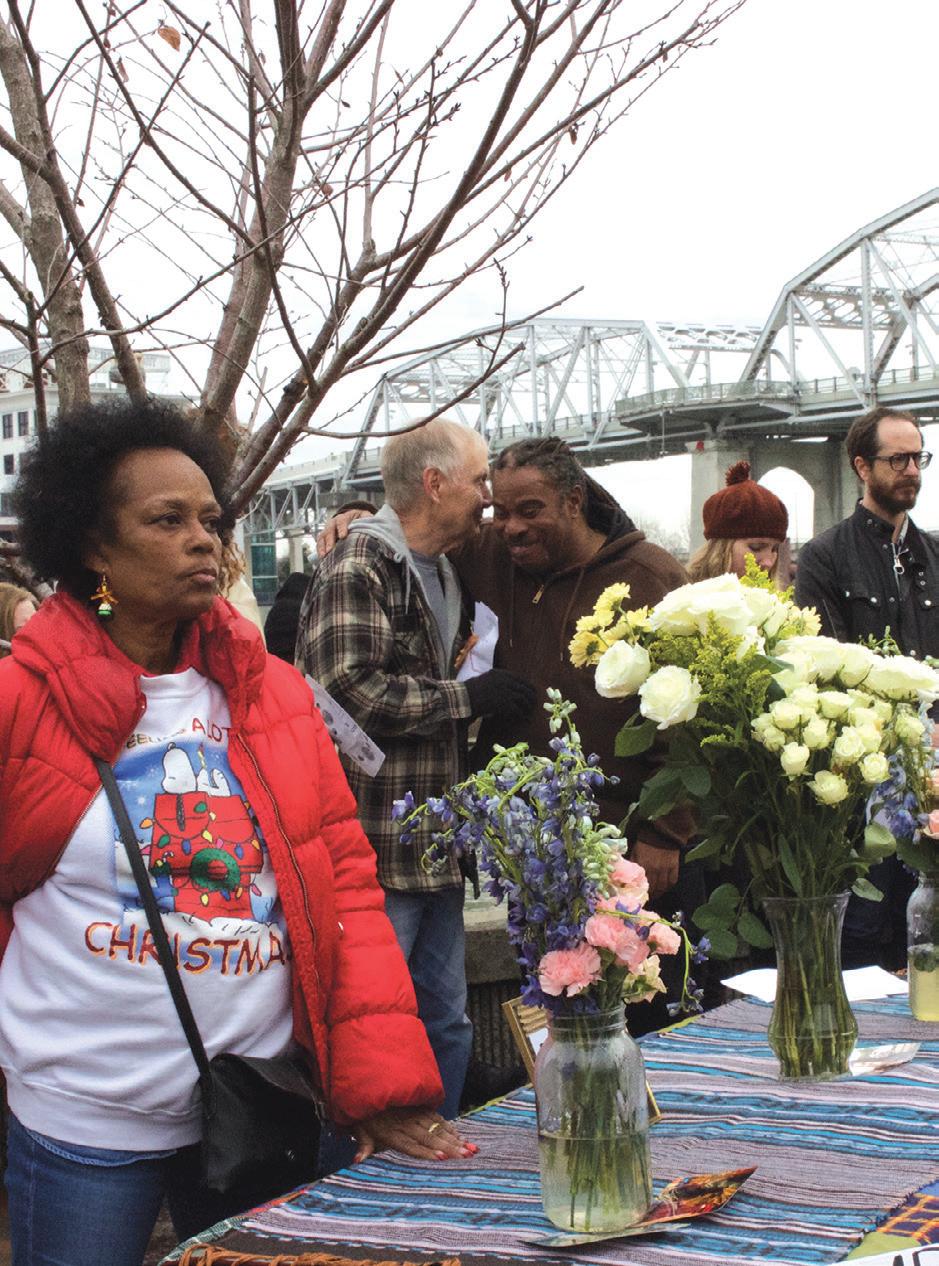
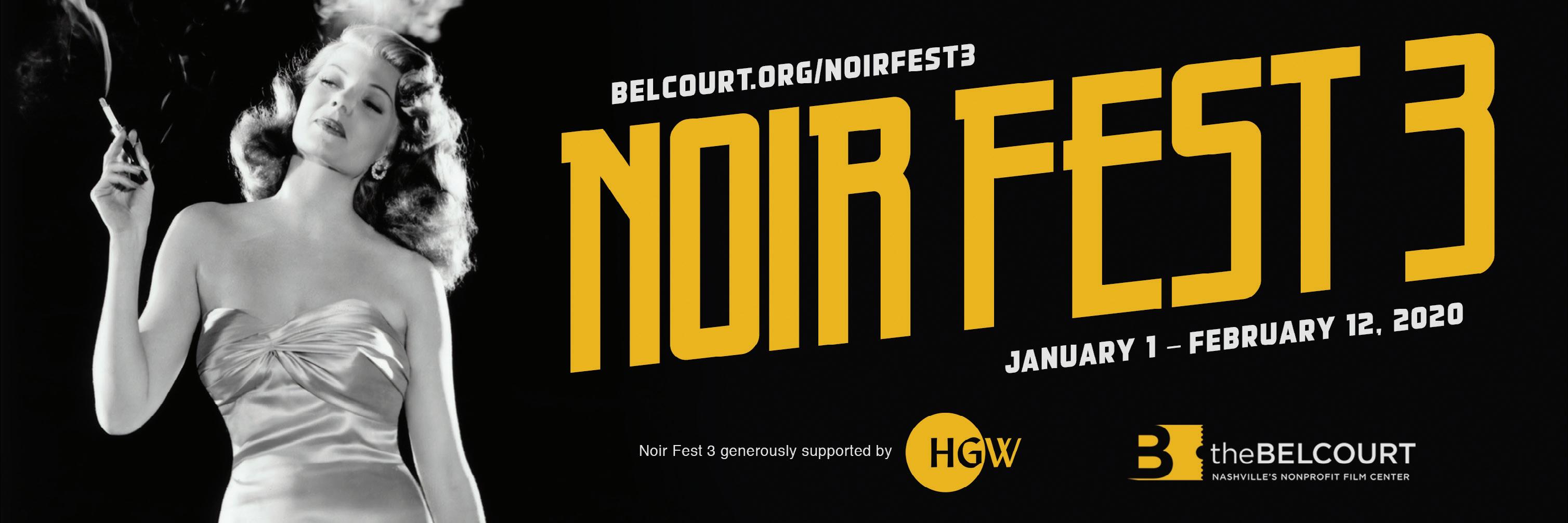
It’s that time of year when film journalists of every stripe are preoccupied with summing up 12 months of movies into a few limited categories, from dubious lists of nominations. Of course, overlooked gems and disappointed fans are part and parcel of awards season. This post-holiday calm before the storm is a valuable time that I use to reflect on the films that spoke to me most personally, before I’m even aware of trending front-runners and critics’ darlings. The following are some of my favorite pictures, people and performances in front of and behind the camera in 2019.
This past year was a great year for performances by veteran actors: Eddie Murphy delivered a career-defining performance in Dolemite Is My Name. This fantastic biopic about the eponymous comedian-filmmaker is one of the year’s best movies, and it was directed by Memphis’ own Craig Brewer (Hustle & Flow, 2005). Other great actorly turns included Joaquin Phoenix in Joker, and both Al Pacino and Joe Pesci in The Irishman

Others took their turns stealing the screen in 2019: Meryl Streep’s double reveal at the end of The Laundromat reminded me that she’s still the Queen Bee, and Renée Zellweger silenced the doubters with her intense — and intensely talented — turn as Judy Garland in Judy. Writer-director Greta Gerwig and the cast from Little Women — including Saoirse Ronan, Emma Watson, Florence Pugh, Eliza Scanlen, Laura Dern and Meryl Streep — delivered the ensemble performance of the year in one of 2019’s best films.

Movies like Dark Waters and The Report marked a return for dramatizations of real life scandals, and those films both pair nicely with Scandalous: The Untold Story of the National Enquirer. This one is an actual documentary that maps the evolution of the notorious tabloid alongside the decline of mainstream media journalism. It’s a fascinating and furiously timely movie.
Once Upon a Time in Hollywood isn’t the best

film of the year or the best film of Quentin Tarantino’s career, but it’s the 2019 film I most want to watch again — preferably always in 35mm at the Belcourt Theatre. I’d say something similar about Harmony Korine’s love letter to Florida, The Beach Bum. This one often feels like a lesser, lighter version of the writer/director’s bonkers Spring Breakers, but there is something so charming about this sun-and-sex-drenched-story about grief and art that I could watch it on repeat.
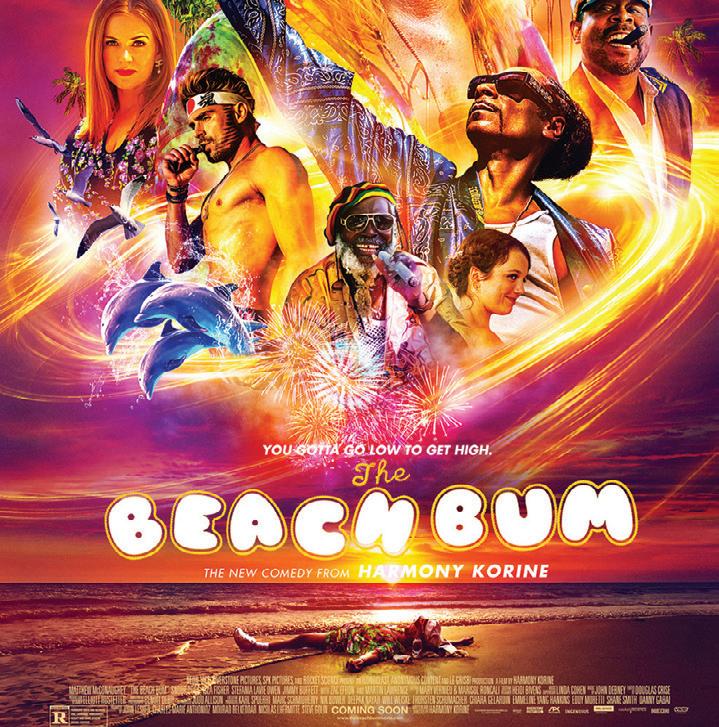
The South Korean black-comedy thriller Parasite is probably my favorite for best foreign language movie of the year. Bong Joon-ho’s film is the latest in a trend of class-conscious films as diverse as Cosmopolis (2012), Snowpiercer (2013), Sorry to Bother You (2018) and even Joker. Here’s to more films that are willing to look past the various symptoms of societies ills to confront the actual structures that allow lawless elites to exploit poor and working people the world over. The revolution will not be televised, but it might be playing at the movies.
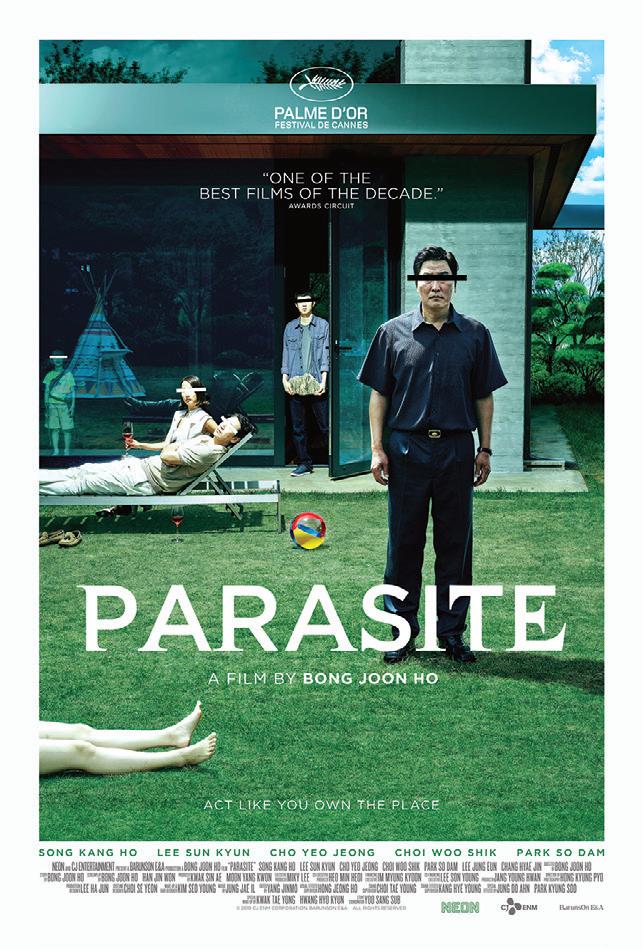
My favorite movie of the year was the hilarious, poetic and gorgeous The Lighthouse. I’m surprised that I’m not seeing this one on more best-of-the-year lists, but, again, we’re just getting started. I had a ball watching the performances by Willem DaFoe and Robert Pattinson — and Jarin Blaschke’s cinematography makes this one of the most striking pictures of the year. I was blown away by director Robert Eggers’ debut feature film, The Witch, and The Lighthouse feels like The Witch’s masculine bookend as both movies combine a total commitment to period realism with an embrace of the magical. The result in an uneasy, surreal tone I’m calling Egger-esque. May 2020 be another great year at the movies.
Joe Nolan is a critic, columnist and performing singer/ songwriter based in East Nashville. Find out more about his projects at www.joenolan.com.
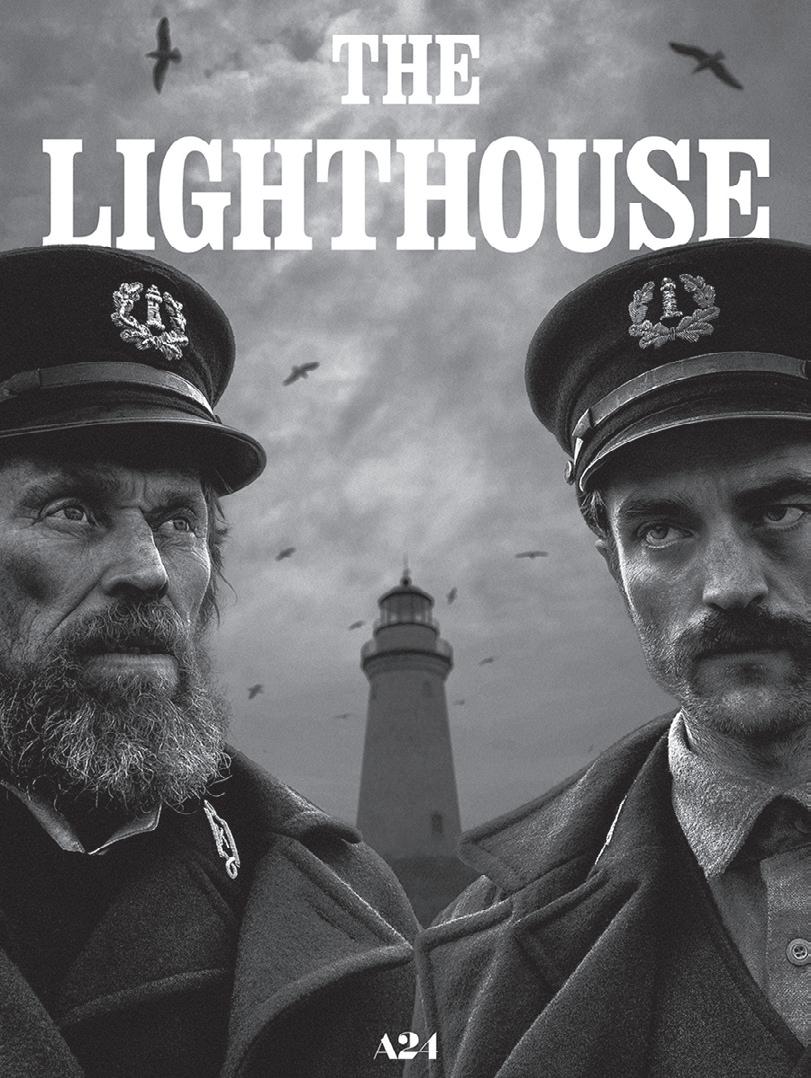
Editor’s note: This story was produced in partnership with Law@the Margins through a Community Based News Room (CBNR) series that examines homelessness issues across the United States. The eight-part series is supported by a Solutions Journalism Network grant. Vicky Batcher was a source for this story and also contributed reporting and writing.
Paul Arndt knows all about people experiencing homelessness having encounters with the police. He used to live in the recently closed encampment under the Jefferson Street Bridge, a place where many nonprofits frequent, giving aid to the homeless living there.
Every so often, police will force these encampments to clear out, citing trespassing laws. But his first real issue with getting a citation happened when he was selling The Contributor in front of the popular downtown tourist spot Puckett’s Grocery & Restaurant.
Arndt is 65 years old and legally blind. Unable to stand for long periods of time, he had brought a camp chair to sit on while he worked. The owners of the business knew him and welcomed him in the months he had been selling there. Then one day, a police officer came by and issued him a citation for obstruction of passageway.
Arndt recounts that an officer came by and said, “I could arrest you for having that chair on the sidewalk, but I’m not going to. Instead I’m going to give you a ticket.”
The following week, the same officer came by and arrested Arndt for sitting on a stool while selling his papers. This time, he said, “I’m thinking about arresting you.” Arndt said, “Go right ahead. I’m not doing anything wrong.”
The officer then cuffed him and took him downtown, booked him and locked him in a cell. Three to four hours later, a woman with the police department came in and spoke to Arndt. She explained that he wasn’t allowed to obstruct the sidewalk like that and stated they would be releasing him.
“I felt picked on being homeless and all,” Arndt said.
The city of Nashville is in the beginning stages of offering alternatives to the typical criminal justice system, but that doesn’t stop businesses or private property owners from making calls to the police about people experiencing homelessness — which leads to a lot of people being asked to move out of sight.
In Nashville, from January to October 2019, 464 people experiencing homelessness were arrested for criminal trespassing, according to data from Metro Nashville Police Department. Many of them got arrested on this charge more than once, making it a total of 724 arrests. In that span of 273 days, that averages out to 2.6 arrests per day. In that same time period, 37 people experiencing homelessness were charged with obstruction of passageway.
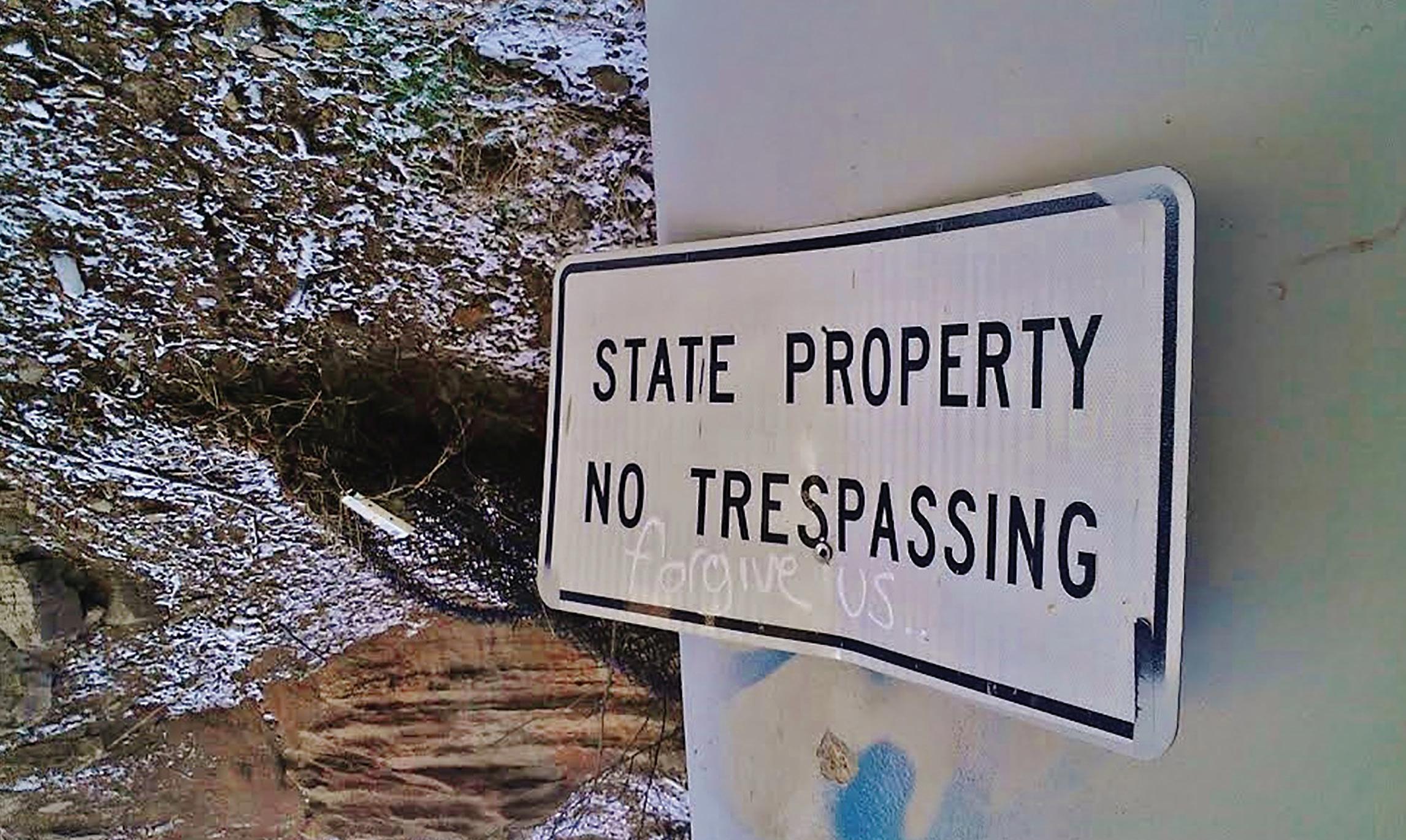
At the Central Precinct, located in the
heart of Nashville, Cmdr. Gordon Howey encounters people who are homeless often. He says criminal trespassing and obstruction of passageway are two of the most common charges seen amongst people experiencing homelessness.
“Hearing complaints come in over the police radio from citizens, trespassing tends to be something that occurs each and every day —somebody calls in about someone in a parking garage, in a door, in front of a business, a stairwell, things like that. Not with every encounter with an officer is an arrest made, but there’s the potential for it,” Howey says.
A population harder to collect data on is those living in their cars.
Vicky Batcher, co-author of this story, has lived in an RV for the past two years. She’s received some knocks on the window, with “sorry you can’t park overnight here” from some local Metro officers, but for the most part, they’ve left those living in their cars alone. Places that are open 24 hours have the best chance of being left alone but are usually far from much-needed services and food, she says. Walmart used to be a safe place, but some people who are living in their cars have seen a crackdown on those living in cars parked in the parking lot, even their own employees, Batcher added.
“The private security companies like the one that works for Walmart wouldn’t even let us park in their lot to do shopping without some sort of harassment,” she says.
Batcher has encountered threats of being towed and jailed if she didn’t move the RV, which gave her anxiety attacks. She was evicted from a dwelling seven times in 25 years, and memories of being thrown out into the street after each eviction brought back the fear of once again having to turn to the streets.
“Threatening to have your only home taken away from you is a below-the-belt blow just for parking,” Batcher says. “It made me feel like an eviction all over again. I was scared and not sure what to do when I left. A person waiting to meet up in a parking lot is given more leeway than someone homeless.”
Part of Stephanie Harris’ job at Metropolitan Development and Housing Agency is to work with people to get charges expunged from their record to better their chances at getting employment and housing. Having navigated the court system with many low-income folks, she says people enduring poverty experience the court system much differently than more affluent people. Money is owed for fines, court fees, even classes to be taken as an alternative sentence. It also costs to have those charges expunged later, if eligible. Harris says she advocates for court outcomes to be the same across income levels.
“Let’s say the same shoplifting charge,” Harris says. “I go in with a [hired] attorney, and it’s my first charge. It’s a given that my attorney is going to ask for diversion, the expungement option, to be written into my disposition, so that if I complete probation successfully, I can just pay my fee and get it expunged. Somebody else might go in, and they’ve gotten arrested, and they’ve been kept in jail because they couldn’t bond out. Nobody is at home taking care of their children, so they plead guilty and get out and go home or go back to work.”
Having any guilty charges on your record can affect employment opportunities, Harris explains, and it’s not uncommon for hiring done through a computer system that rejects anyone with a guilty record, regardless of what kind of charge it was.
Free Hearts, a local advocacy organization led by formerly incarcerated women, started a #ItsNotACrime criminalization of poverty campaign in response to some of the things they were seeing in the community. Gicola Lane, statewide organizer for Free Hearts, says she saw a man experiencing homelessness charged with theft of a grocery cart. He was sentenced to prison because the value of the cart was above the threshold for a misdemeanor. The group has been collecting feedback from people experiencing poverty to inform recommendations to local and state government.
“A lot of people just say, ‘No one has ever asked me this before,’ ” Lane says. “No one has taken the time to say, ‘Is it fair?’ If someone has money, they can get out of jail, but because I don’t, I have to sit there?”
Some Nashville organizations are working toward addressing the repercussions of the criminalization of homelessness and poverty.
The Nashville office of Baker Donelson law firm is in the planning stages for a homeless court.
The firm will draw from its work at the monthly Homeless Experience Legal Protection (HELP) pro bono hours with people at Room In The Inn, an organization that organizes shelter for and offers educational services to those living on the streets. This new homeless court will have a specific docket and meeting time that only deals with charges like criminal trespassing, possession, public urination and public intoxication, says Christopher Douse, chair of the Nashville Pro Bono Committee and coordinator of HELP for three years.
“It’s serving a need,” Douse says. “We’re providing an avenue for what are typically these minor criminal issues that disproportionately affect the homeless population to come forward and be on a streamlined docket with a court that is understanding the population that’s coming before them, and working to clear those off with dedicated time from public defenders and the [district attorney] to work on it. Otherwise, they get lost in the mix of everything else that’s going on.”
Nashville would join Los Angeles, New
Orleans, Chicago, Boston and Houston, and a number of other cities in having a homeless court. The Nashville court is looking at best practices for a homeless court in New Orleans, where the HELP program also began.
Katie Dysart, coordinator for the homeless court in New Orleans, says a best practice is to organize a community of contacts, from local housing and employment resources, to the local bar — it’s about adding value to the homeless community. She adds that the homeless court has lightened the general sessions court docket and gotten fines and fees traded for things like community service or maintaining employment for a certain period of time for people experiencing homelessness.
“Many homeless individuals are barred from housing, employment, or other basic daily activities given outstanding warrants that carry fines that they cannot pay.” Dysart said via email. “The Homeless Court has been able to get these folks into housing, employment, and satisfy fines without monetary contribution.”
for myself? Where am I going to spend the night? Especially as we approach the winter. But looking at it from our standpoint, [we serve those who have] a psychiatric crisis. Sometimes, the crisis of homelessness can lead to a psychiatric crisis, or vice versa. There’s a connection there, and I think that’s why you see high rates of people with mental health issues that are homeless.”
Davidson County Sheriff Daron Hall, says the reality of society is that the police are often called on to address mental health and homelessness. And it’s not always as severe as the threat of suicide or homicide, which is what the Crisis Treatment Center covers. When the sheriff’s department started looking into why people were repeatedly being put in jail, a couple of the top reasons were failing to do things the criminal justice system asked them to do, such as attending a court date or meeting with a probation officer. When you fail to do those things, a warrant for your arrest is issued. If a police officer comes into
tally ill by the mental health professional. Court, jail time, probation and all the fees that go along with it could be waived if a person voluntarily goes into treatment. Part of the plan is also to have a support system waiting when they get out, be that inpatient or outpatient care.
“A lot of homeless people are arrested more than one time in a year, and more than one time in a month even,” Hall says. “Those are the candidates that we’re looking for. People who aren’t being served well at all by the criminal justice system… It keeps happening because you’re doing nothing to help what’s driving the issue.”

In these proposed solutions, the police are still called on to make decisions to defer to other service providers, or not. There’s still some interaction between the police and people who are homeless, often in an area outside of police specialty.
Lindsey Krinks, an advocate for people experiencing homelessness and co-founder of Open Table Nashville, a homeless outreach and education organization, says proposed solutions to criminalization of homelessness such as the Behavioral Care Center should prompt a larger conversation about the policing system in Nashville. She sees a need for including groups like North Nashville’s Gideon’s Army, which serves as violence interrupters and comes to the scene of shootings.
“When there’s a shooting, they’re on the scene, and the police are too. But they’re able to mediate in a way that the police are not,” Krinks says. “We need the same thing for the mental health system, for situations of homlessness and poverty. Homelessness is not a criminal justice issue. It is an economic issue. Mental health issues are not a criminal justice issue. They are mental health issues. Public intoxication is not a criminal justice issue. It’s a public health issue.”
She says a win for the community is the Nashville Outreach Team for Encampments, which came out of the encampment task force she was part of after the city closed Fort Negley, a longstanding homeless encampment in Nashville. This team can serve as first responders, alongside or instead of the police.
Mental Health Cooperative, an organization that offers mental health services to low-income Nashville residents, created a facility that seeks to keep people out of the criminal justice system to begin with. The newly built crisis treatment center serves mainly people on TennCare or without insurance, and offers an alternative to jail, where police officers can bring people having a mental health crisis, when they have become a danger to themselves or others. One of the drivers to building this center was to streamline the process for police, where they could get back on the street as quickly as possible.
“Homelessness in and of itself, you could call crisis,” says Jacob Henry, supervisor of emergency psychiatric services at Mental Health Co-Op. “There’s just a lot of stressors that come with that — how am I going to care
contact with a person with a warrant, they have to arrest them, even if the charges end up getting dismissed in court later — the Crisis Treatment Center isn’t an option at that point. But the Behavioral Care Center, which is slated to open in March 2020 and also staffed by Mental Health Co-Op professionals, will be.
“I believe there’s going to be a need for our beds in this system, unfortunately, because the criminal justice system is asked to solve the mental health problems a lot of times,” Hall says. “It’s not a great thing, but that’s where we are.”
With the Behavioral Care Center, the booking room — the first step for someone taken into custody — will have a jail staff member and a mental health staff member. The people who qualify to be moved directly to the Behavioral Care Center would be charged with a misdemeanor, which is what 80 percent of charges are, and diagnosed men-
“When people see an encampment, they call the police, and instead of having the police be the first responders when there’s no instances of breaking the law other than trespass, [there could be a more effective response],” Krinks says. “We said it’s a best-practice in other cities to have a homeless outreach team respond.”
Krinks added, “I would like to see Nashville — and there’s a number of people talking about this and working toward this now — have a different kind of first responder that doesn’t just include law enforcement but also includes trained professionals, for certain calls. Certainly police are going to be needed in situations where violence is involved or weapons are involved.”
While many of these solutions are in their infancy, Nashville is about to have more options than ever when it comes to helping to decriminalize homelessness.
But it’s up to the police and the community to use these resources thoughtfully — to change what justice looks like for those experiencing homelessness.
I made a lot of resolutions this year, Aquarius. Some would say too many. There’s just so much I want to change. But I’m finding that the more changes I pile on, the harder it is to keep up with any. I slip up once and by three in the afternoon I’m asleep in a bean bag chair under three empty cartons of vanilla ice cream. More rules seem to lead to more opportunities to fail. I think we might need to stick to the basics, Aquarius. Maybe just one-day-at-a-time it. Maybe for the rest of today, just treat yourself the way you’d like to be treated. Maybe try it again tomorrow.
The Mayans were drinking chocolate as early as the 6th century. It was mixed with water, chilis, and spices and served cold. This went on for at least 1,000 years before European explorers arrived. They knew chocolate was special and rare and so it must be valuable, but they didn’t love the taste. It wasn’t until the 17th century that someone decided to add milk and sugar and serve the drink hot. Who knows what you might discover this year, Pisces. Maybe something you’ve been doing the same way for ever that you could revolutionize just by changing a couple of ingredients.

Like most amateur astrologers, I have two cats. One’s friendly and playful and curious and sweet — like a sunbeam with whiskers. The other has always been … well, sometimes she’s downright mean. But lately, mean-cat has lost her hearing. It’s not unusual. Especially for older female cats. But something else has changed. She started sleeping right next to sunbeam-cat because she needs his ears. She’s gotten a lot more cuddly in general. She can’t do it on her own anymore so she had to make friends. It might be time for you to start leaning-in to those around you as well, Aries. I won’t question your motives as long as the results are positive.
In a 1981 interview, Barbara Walters famously asked Katharine Hepburn: “If you were a tree, what kind of tree would you be?” The moment followed Walters for years as an example of the kind of trite, unserious journalism she was associated with. The problem is, that moment didn’t really happen. Not exactly. In the interview, Hepburn said that she feels like a tree. Walters asked “what kind?” It was a relevant follow up to an odd metaphor. Sometimes it’s hard to shake the image people have of you, Taurus. Luckily, you don’t have to. Just do the work. Do it well. Don’t worry about your reputation and your results will speak for themselves.
It’s tough to keep resolutions. It’s hard to make a change. But I’ll tell you one thing you can do to improve your life in the new year that takes less than 30 minutes and will last you a good while. Clean out your spice cabinet. Throw out anything that’s expired or that you know you’ve had for too long. That dill weed that you bought just for that one lima bean casserole you made six years ago isn’t going to get used again. Throw it out. Buy yourself some new spices. Some new flavors could make for some big changes.
What was your greatest achievement of the last decade, Cancer? You did so many things. Did you get a job or a degree or an apartment? Did you get married or divorced or stay solo and in charge? Any of these might be huge landmarks in the history of you. But over the next decade, there’s something else I want you to look for. Go deeper. Don’t just change your status or your geography. Get quiet and find out what’s inside of you. In 10 years you could know yourself so much better.
As of 2017, there were 1.386 billion people in China. You probably don’t think about that a lot, but I thought you might be interested. It’s just that I know you wanted to get a fresh start on some things this year and I know it’s already slipping away. It’s hard to make new patterns. It’s tough to keep resolutions. But Chinese lunar new year starts on Jan. 25th this year. It’s almost the year of the Rat again! The first symbol in an ever repeating 12-year cycle. So I just thought I’d let you know that for you and 1.386 billion other people, there’s still another chance to start over. It’s coming right up.
It’s cold outside and the sun is down before I get home from work. Makes it hard to want to head out the door and go for a walk. Makes it hard to want to start a new project. Makes it hard to want to fold the laundry in the basket that I’ve been living out of like a portable closet I just want to crawl into bed and binge watch fantasy TV shows until I fall asleep and wake up in April. If you’re feeling the same, I’ve got two thoughts. One: you’re allowed to do exactly that. Hibernate if it’s what you need. Two: Before you pull the blanket up over your eyes, try to do one, just one thing to help yourself out. Fold some shirts. Call a friend. Go for a walkif only to the mailbox and back.
If you encounter an independent microstate led by two princes, don’t worry, you’re probably not stuck in a Spin Doctors song. You’re most likely just travelling through Andorra. The Principality of Andorra is a tiny nation on the border between Spain and France and, yes, it is a diarchy led by co-princes. It reminds me, Libra, that you’re in charge of a lot right now and in some areas it might be helpful to share the load. Consider finding a co-prince to bounce ideas off of, share responsibility, and split duties with. That’s what I said, now.
I’ve never been good at sports, Scorpio. I tried them all: 8th grade basketball, 8th grade football, 8th grade baseball. Now that I think of it, maybe it’s kind of weird that as an adult I base my perception of what I’m good at on what I was good at in 8th grade. I just assume that if I couldn’t learn to make the shot when I was 14 I couldn’t learn to make the shot now. Where does this kind of thinking make its way into your life, Scorpio. What did you try once and never try again? Maybe give it another go. Find out how you’ve changed.
It is said that Gautama Buddha lived into his 80s. His last meal was graciously prepared by a blacksmith named Cunda. It was a supper of either pork or mushrooms. It’s a strange detail to get hung up on, but it has caused some controversy. Cunda’s dish of “sūkaramaddava” can be translated either as “tender pig meat” or “a food enjoyed by boars” which, as everyone knows, is mushrooms. Vegetarian Buddhists insist that it’s the latter while other traditions celebrate the last meal by cooking their own feasts of pork. Communicate with clarity this week, Sagittarius. Maybe in 2600 years your followers won’t have to debate exactly what you meant.
What did you bring for lunch today, Capricorn? I’ve got some beans and rice and an apple and one of those little cheeses in red wax. What? You didn’t bring anything? Not even an empty lunchbox? This is a situation we can fix. Look, I’ve got enough beans and rice to share and, although I already ate the little cheese you can have this unicorn that I molded from the red wax. We’re only gonna get through this year if we can help each other out. Enjoy your half of the apple. And if you run into somebody else who needs a boost, help them out.
It’s not like I thought it would be.
I was approved for affordable housing (meaning the price of my rent goes by what I earn) and the following week was moving into my own apartment. I knew after doing all the paperwork that it felt right. With my son Paul moving in with his brother who recently separated from his wife, there was only me and my dog Faith. Here we are living in a beautiful studio apartment filled with new hope and finally what feels like my life is coming together. Faith has found some opposition with some of the residents who are afraid of dogs, but we’re making it work and she even has a boyfriend already named CoCo.
Friends asked what color schemes I was using for each room, which helped out greatly. A bed inside a sofa sleeper made up of earthy tones that remind me of the early ’80s,
made sleeping so much better than on the floor. I’m a bit retro myself so I made it work. Faith has claimed half of the sofa as her own. An eight cube storage unit from Walmart, sitting on it’s side, holding a TV that was purchased as a gift, completed the living area.
I have the perfect writing desk: simple and sleek with one main drawer, complemented by a decorative parson chair to sit on that’s comfortable but not too comfy. I hope to add some outdoor warm white porch globes to hang above the book and chair area, instead of the floor lamp. My friend John gave me a blue glider and matching ottoman, which gives me a small desk/reading area where I can still hear the TV, but not so loud that it is distracting to my writing.
A pre-lit Christmas tree came soon after I moved in from friends in Phoenix to make
my home festive for the holidays. To be able to decorate my own place has been such a joy that I never thought I’d be able to do again. I used to thumb through magazines and do some wish decorating, but only wish. Now it’s become a reality.
What’s next? Finding a new spot to sell the paper, moving from Hermitage to Nashville and continuing my writing.
It wasn’t as easy as most might think. It’s not simply moving stuff in and that’s it. I bet most women are shaking their heads right now understanding every step: unpacking and getting things like you want them. After all, this is home.
I lived in Hermitage for more than 12 years in one form or another. It was home for a long time. Moving away from the kids (both are staying in Hermitage) was an ex-
tremely hard thing to do but necessary for me to move forward. Being able to keep Faith with me was crucial for us to adjust. She’s my Emotional Support Animal and I believe I never would have made it without her even with both of us adjusting to a new way of life and both adjusting to loneliness. The residents here don’t really like big dogs and her being so social was an adjustment for her. And loneliness was an adjustment for me since I don’t really know many people in Nashville. It’s important for me to get out and sell newspapers to become more social and meet new people. At one time I suffered from social anxiety and have a huge fear of that coming back. Being out of the apartment is vital for my mental health. The signs of it are starting so I’ve got to keep moving forward.
“To get a place to live and quit smoking.” CHARLES S.
“To keep writing more inspirational things that helps others and myself with day to day life.” VICTOR J.
“To lose weight and to make more money. (I used to be 295 lbs, now I am 227 lbs.)” CLINECASSO
“To be a better me.” JENNIFER A.
“To make more money!” MICHAEL G.
“To try to make more money.” KEVIN H.
“To start the new year off with a fast start: 1. Two jobs 2. New girlfriend.”
PIERRE
“To have better health by working out and eating healthy. I love salads.” SHAWN L.
“To have brand new furniture for my new apartment.” ANTHONY G.
“To eat more healthily.” CHUCK C.
“To come up and get a program started in which I can assist Davidson county in bringing a stop to homelessness. To network with all the resources in Davidson County on coming together and doing their part. My attempts are to open up a program that will assist the homeless called ‘Back to Basics.’” MAURICE B.
“To stay in housing.” VICKY B.
“To get a job, hopefully.” PERRY C.
“To have a place to live for me, Oreo, and Matt and not lose it and get off the streets. We need this.” JULIE B.
“To get new teeth!!!” MARIO M.
“I was going to write this later, but my resolution is to not procrastinate.” KEITH D.
“To get my ‘touch’ back.” DON N.
“To get new glasses.” DWAYNE B.
“To lose weight.” CLINT M.
“To take good care of my new puppy.” BAMA
“Get off the streets and hope my surgery goes well.” JAY E.
“I’m going to detox.” ERIC H. “Being a better businessman.” DAVIS H. “Stay healthy.” MICHAEL W.
“Go to church more, stay out of the projects, stop smoking and drinking.” CURTIS J.
“To be more productive” THERESA S. “Quit smoking!” TRUDY H.
“Save money for a hip replacement.” JEFFREY H.
“Keep prayed up and caked up.” WILLIAM H.
“Get closer to Jesus.” DAVID S.
“Stay happy.” MARY B.
“To quit smoking.” DOYLE F.
“I’m never going to drink alcohol again!” STEVE C.
“Rock On! I beat cancer.” KEN J.
“To have a blessed 2020.” KIM B.
“Spend more time with my kids and grandkids.” DAVID W.
“Stay out of trouble!” LAMONT C.
“I’m getting my retirement check and I am going to tour the USA in a RV.” DAVID N.
“Lose weight and get off of the streets.” THOMAS P.
“Eat better” CHARLES D.
“Wish all people health and peace” TERESA S.
“Quit smoking cigarettes.” MIKE D.
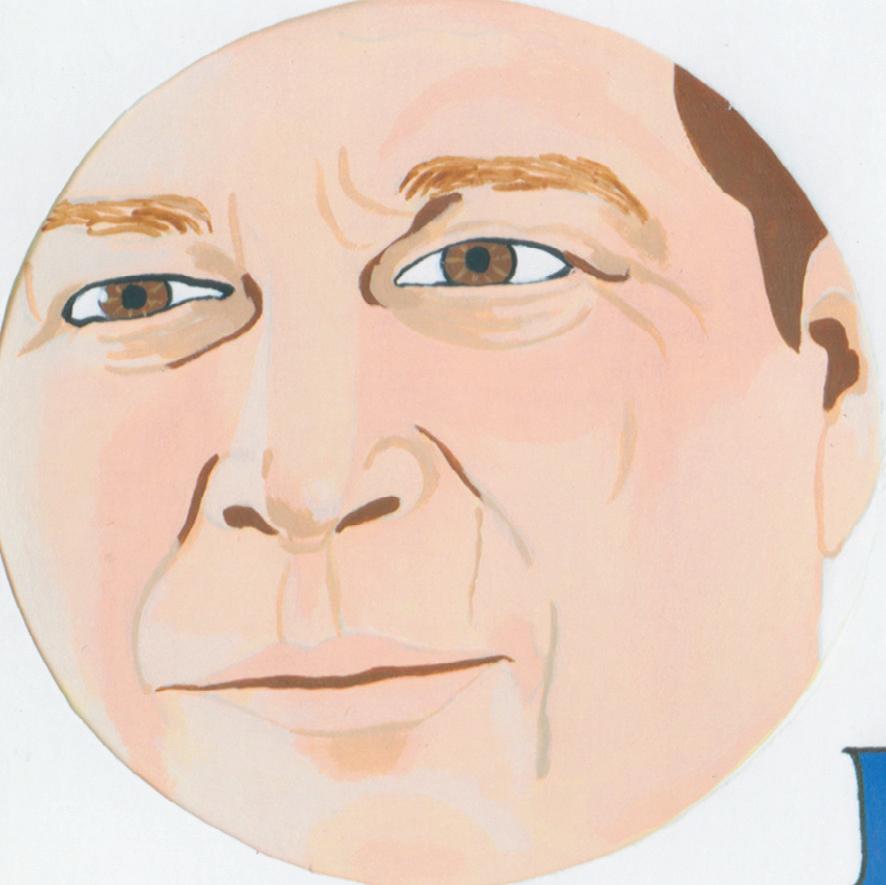
I can remember when I was 7 years old, I had to go to a hospital for a nervous break down. After two weeks in that hospital, I turned 8. When I turned 8, I was moved to a different building with adult men. I had a really hard time there. The very fi rst day I was there, I went to sleep on a big old table, curled up in a ball. And for some reason, this guy named Willus Buck came up and hit me dead in my spine as hard as he could. Why? I don’t know, but it hurt so bad. And I was only 8 years old. It took me 10 years before I actually got out of this hospital because my breakdown was so bad over my brother getting murdered when I was 6 years old and it took a year before it actually hit me.
How I got out of that hospital was I escaped three different times. The last time I escaped, I stayed gone for two weeks and called them to ask if I could come get my money and clothing. They said, “Yes you can. You have been released. Medically dishonored.” I didn’t understand what that meant, but they explained that it meant I was discharged against medical advice.
My life really changed from bad to worse. At fi rst it didn’t, but after I got out, I got a combo together, which they call a band nowadays. I had a combo and I was the lead singer. We called ourselves Johnny and the Hurricanes. We played at the hobby shop right across from the old juvenile hall and Howard’s school football field. Th ings turned worse because I was burglarizing. It began before I went to the hospital at 5 years old. Why I did this? I don’t know.
When I was in the hobby shop, singing and playing with my combo, I was going out at night burglarizing cars. It caught up with me because I burglarized a place downtown on Broadway. I can’t remember the name of it, but it had clothing, boots, diamond rings — horseshoe diamond rings. I wouldn’t have gotten caught if my cousin wouldn’t have told on me. In a way, I’m kind of glad he did, because I wouldn’t be here today if he hadn’t. When I got out for that crime, I got into more trouble burglarizing and stealing cars because no one in my family would teach me how to drive. My brother tried one time, but
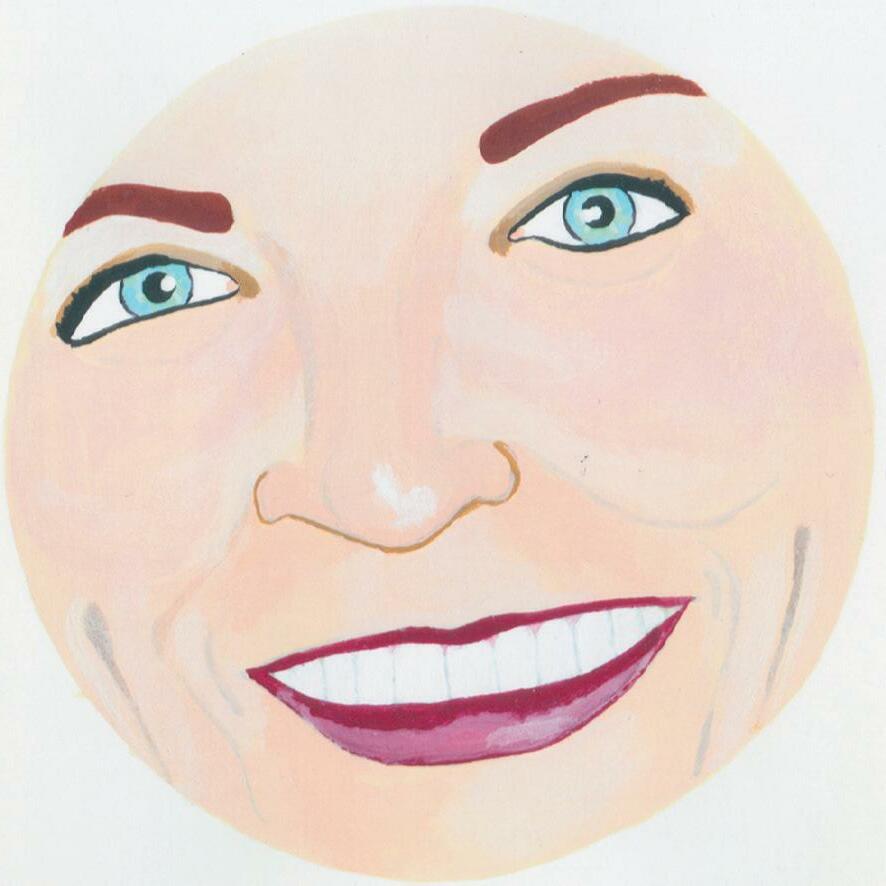
he was scared to death to teach me anymore because it was a stick shift, and I didn’t know how to work it and change them gears. I went to prison a few times. Some of the things I didn’t do; some of the things I did do.
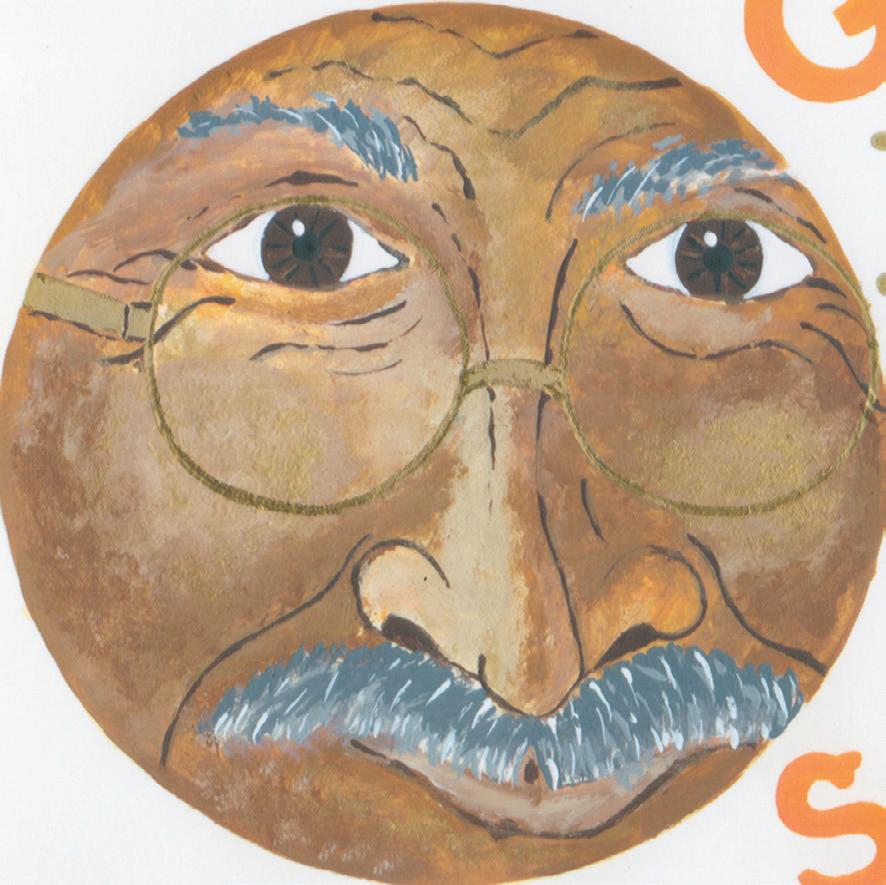
When I say I’ve come a long way, I mean this last time I went to prison helped me get off of drugs. I was tired of the life I was living: not buying my medicine, not buying my food, neglecting to take care of myself physically and mentally with my psychotropic medicine. I even once overdosed trying to get sleep because I took too much of my medicine. They took me to a hospital fi rst, then a rehab, then they let me go and I went back home — to the same place where all the drugs were and the people that were in my house.
When my oldest brother died from a heart attack in his sleep after drinking for many years, that’s when I made a change in my life. I’d stolen from my niece and my sister and they were hurt so bad, it made an impression on me to quit, to get off of the drugs. I knew the only way I was going to do it was to have
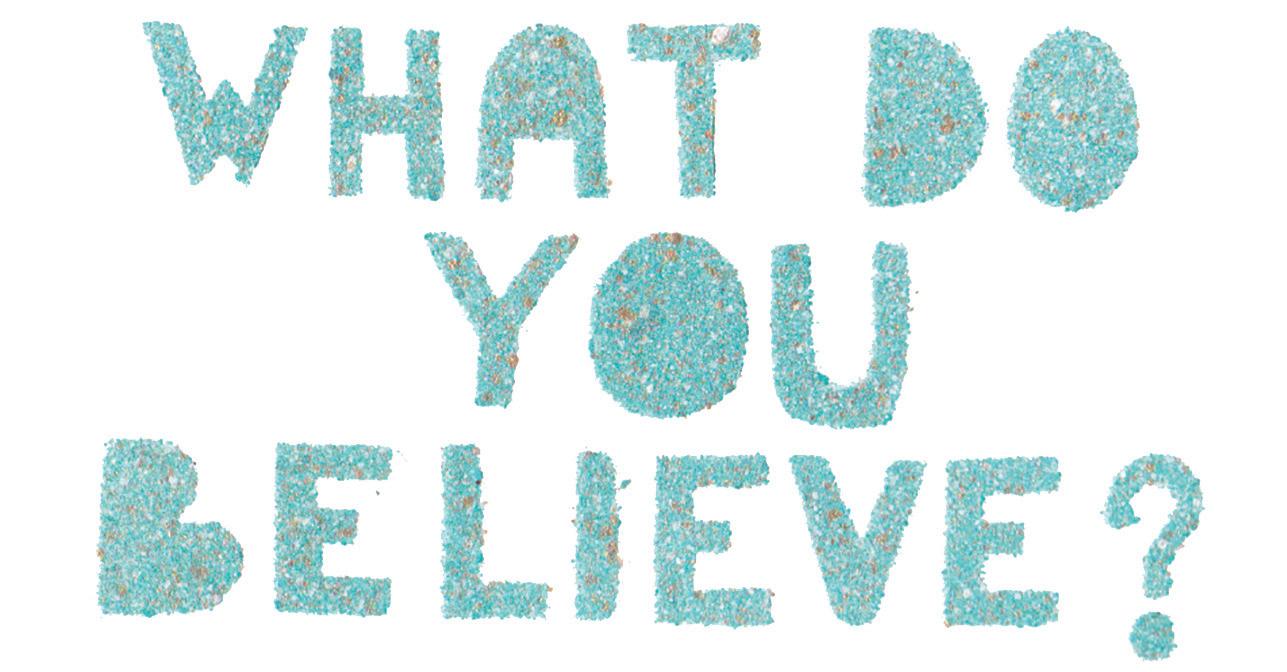
them lock me up again. So, that was the last time I was locked up for something like that.
When I got out, I was playing music downtown. I was playing in front of Bailey’s, singing and playing spoons. The thing is, the law said I couldn’t do that with an amp, and I couldn’t hear over the bars playing music. So I ignored what they were saying, and unfortunately got arrested for playing music down there, and did a 25-day sentence and got a $100 fine. That was my own stupidity.
I found The Contributor the last time I got out of prison. They brought me straight to Room In The Inn. The year was 2013, maybe 2012. Now that I have The Contributor in my heart and a new family (I call them family) I’ve come a long ways with them. I’ve been with them a little bit over a year, and I’ve written quite a few stories with them about my life. I even wrote a jingle for them. I’m really pleased about that because it’s helped me move along with my life as far as being known in the music business. This is talent the Lord, Jesus Christ gave me when I was born. I’m using this to my advantage as far as moving on up, coming a long ways.






One is the same constant It’s just a principle That is my consolation

















When darkness turns to light All is well when there is nothing to remember There’s a pile of dirt with no spirit I just can’t quiet it For death and dying left me alone and crying LIFE







 VICTOR J.
VICTOR J.

Life sometimes is hard, sometimes is good. But, If you don’t let life get you down, you make it through anything life throws your way with help.














 ANTHONY G.
ANTHONY G.
Selling the paper is fun to me. I am amazed at the people I meet. I face 70 percent rejection, but that’s OK. The 30 percent that buy make up for them anyway. I got blessed in all kinds of ways, from 100 dollar bills to honey baked ham.
People give you tips for the work that we do.

If you don’t think it’s work, follow me for a week back and forth downtown to reload my bag.

Then I get to my spot and put on a smile. Two dollars a paper, one paper two bucks, help a vet. I have to live, too. Put the paper in the bathroom. Read it through and through.

If you run out of paper, you’ve got some to use. That brings on a laugh and they think I’m a fool. They buy my paper and I smile too.


If you see me on the street please come my way. I’m the pretty black man on the scooter. Hope to meet you someday.









It’s not right the way it was done— to out-price Section 8. So now I am gone.



Operation Stand Down gave me a bed. After two months on the street, I have some place to rest my head.
I can cook meals and wash myself. But it’s not right for ten men to live in a home, ten personalities for which to deal. I have a hard enough time dealing with my own.

They build yuppie homes everywhere you look. But what about us who are not rich? A project or high rise is all that is left.
Why not take all the city-owned lots and build some homes for the low income people to call their own? I would love a duplex with one neighbor to meet. We could grow a garden with food we could eat.
I want my life back. Where I live, I have too many rules. Break on of them and you are through. Back to the street, then what do you do?














 GARY E.
GARY E.
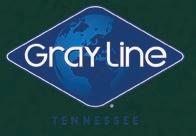





When in doubt, stop and think about what you are considering, so as not to make the wrong choice, when in doubt LIFE Chris W

Life is about breaking rules, About confrontation



Otherwise history would simply stand still Someone has to come along and break the rules Regardless it be a sense of adventure or exploration, What we explore is within ourselves







